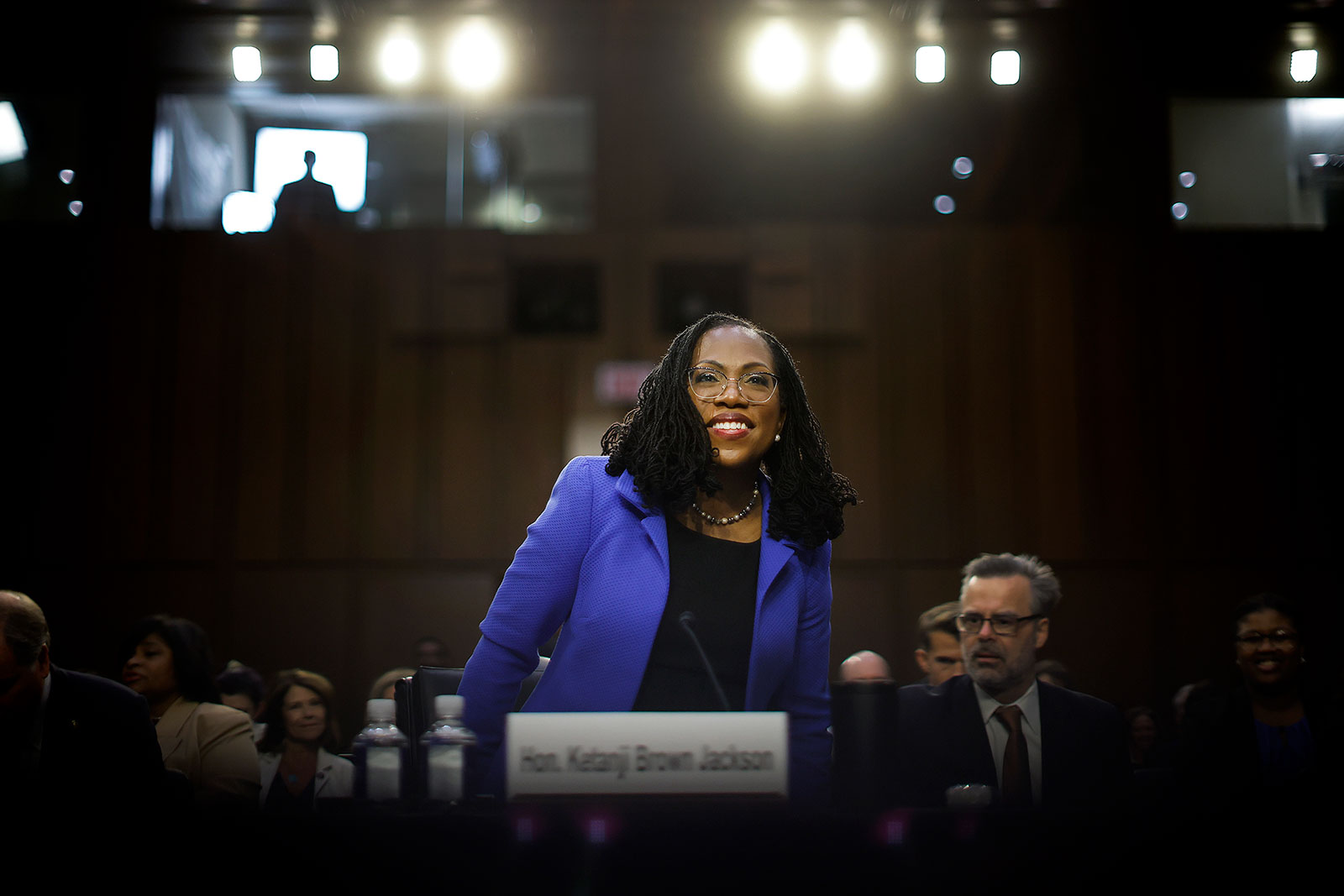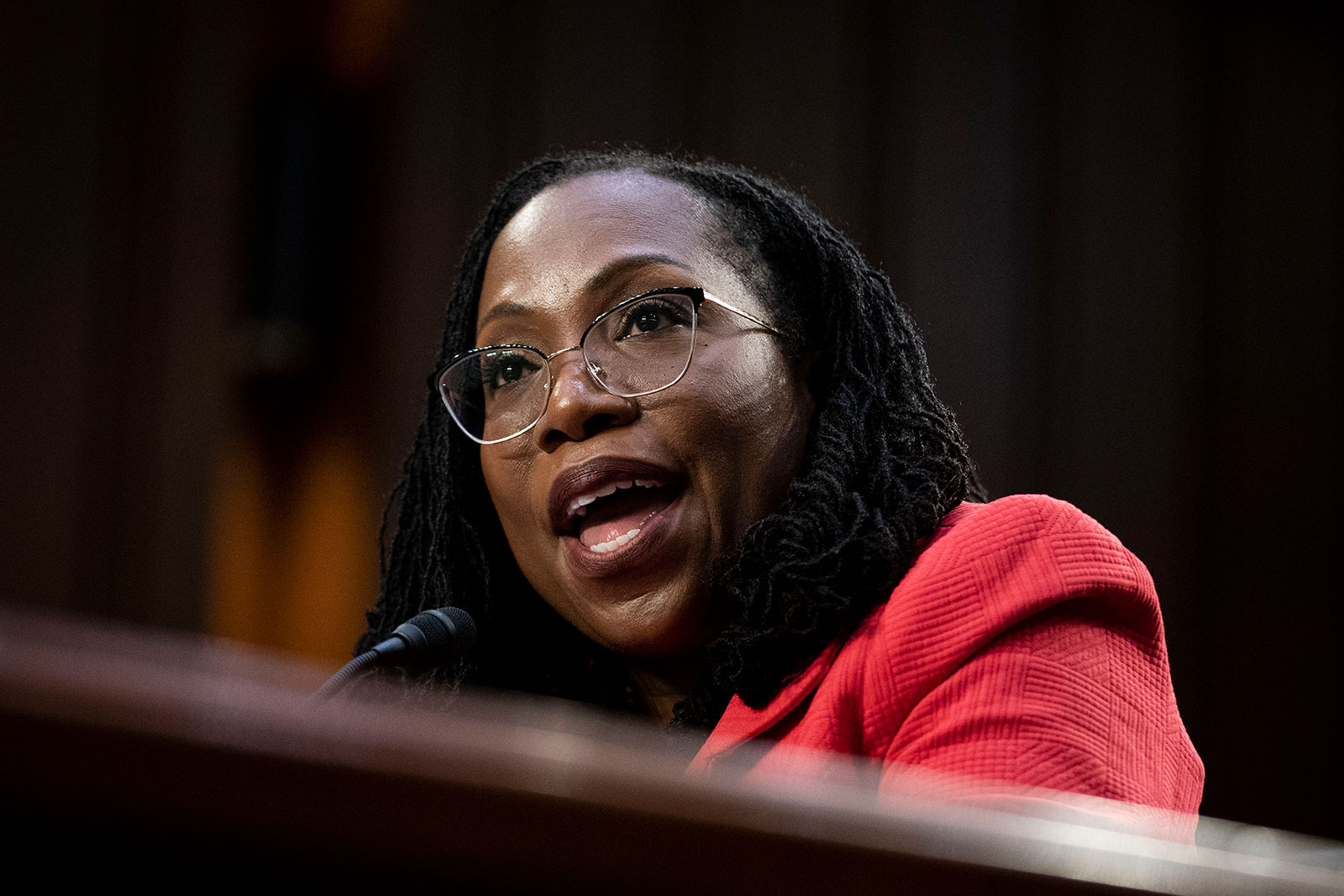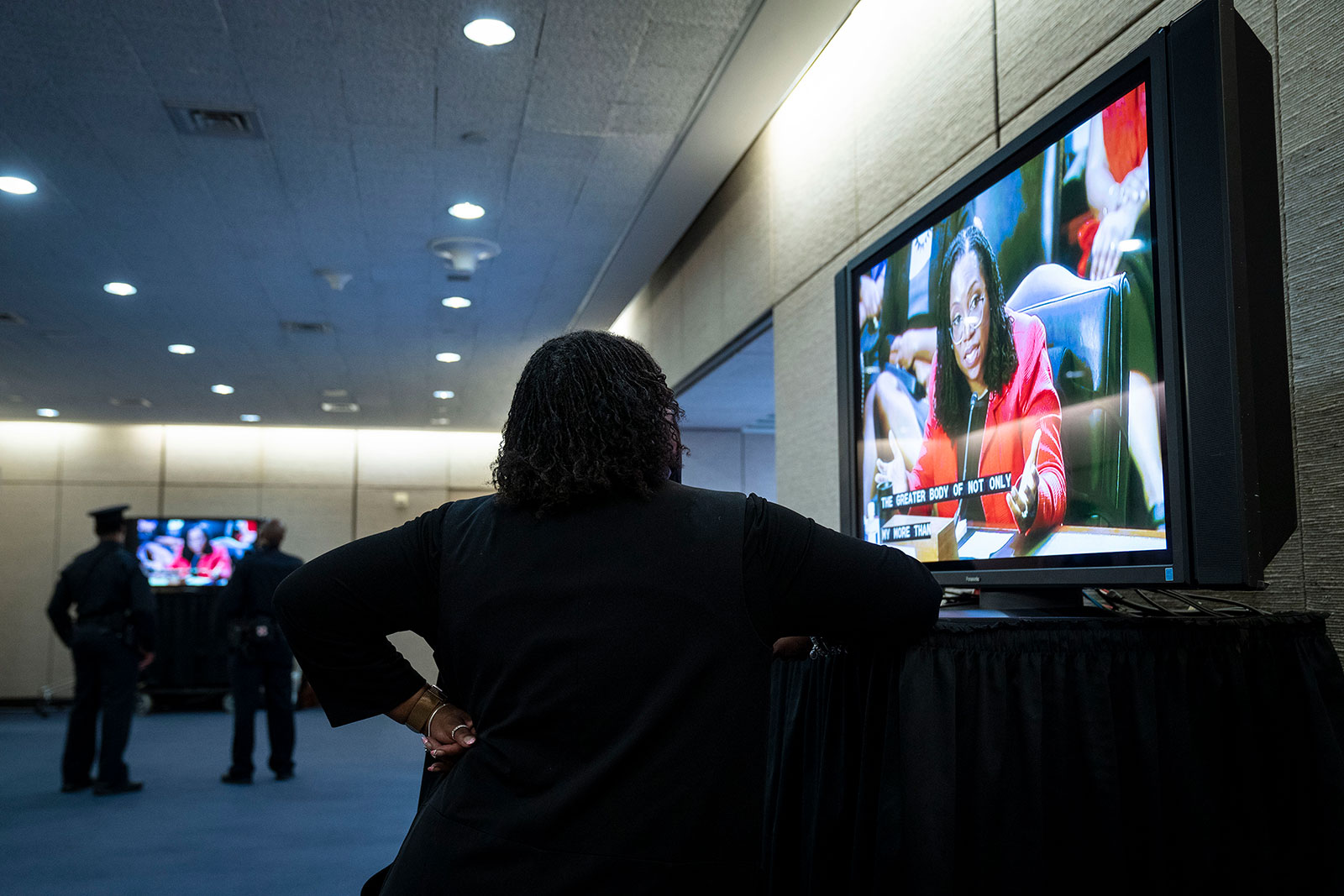
Judge Ketanji Brown Jackson highlighted her record amid sharp questions from GOP senators on crime, abortion and Gitmo detainees

NOW: The third day of Jackson’s confirmation hearings begins
From CNN’s Clare Foran

President Biden’s Supreme Court nominee, Ketanji Brown Jackson, is facing another round of questions from lawmakers on the Senate Judiciary Committee during the third day of her historic confirmation hearings and final day of questioning.
Two senators from the panel —Democrat Jon Ossoff of Georgia and Republican Thom Tillis of North Carolina — will have 30 minutes to ask questions. Following their time, each senator on the panel will be given 20 minutes for additional questions.
“This is a tough assignment, and many have risen to the challenge but none as well as you did yesterday. Thank you for doing it so much,” committee chair Dick Durbin said as he opened Wednesday’s hearing. “I would say this, much of what we heard from a handful of senators yesterday has to be put in context.”
“The overwhelming majority of senators on both sides, I thought, were asking appropriate questions and positive in their approach and respectful of the nominee before us. But for many senators yesterday was an opportunity to showcase talking points for the November election. For example, all Democrats are soft on crime, therefore this nominee must be soft on crime. Well, you’ve made a mess of their stereotype,” he continued.
What happened yesterday: Tuesday featured a marathon first round of questioning that stretched late into the evening as Republicans grilled Jackson on her judicial philosophy, her legal record and past defense work, and support for her nomination from left-wing groups.
Jackson defended her record amid sharp questioning from Republican senators. She refuted claims from Republicans that she is weak on crime by stressing her concern for public safety and the rule of law, both as a judge and an American.
“Crime, and the effects on the community, and the need for law enforcement — those are not abstract concepts or political slogans to me,” she said.
She responded to concerns raised by Republicans over the potential for judicial activism by arguing that she approaches her work in an impartial way and emphasizing that it would be inappropriate to impose any kind of personal opinion or policy preference.
“When I get a case, I ensure that I am proceeding from a position of neutrality,” she said.
Jackson also discussed elements of her tenure in the legal profession that have attracted particular scrutiny —and criticism — from Republicans.
Describing her work as a public defender, Jackson said, “I was in the federal public defender’s office right after the Supreme Court decided that individuals who were detained at Guantanamo Bay by the President could seek review of their detention.”
She added, “Federal public defenders don’t get to pick their clients. They have to represent whoever comes in and it’s a service. That’s what you do as a federal public defender, you are standing up for the constitutional value of representation.”
Jackson also forcefully rebutted concerns voiced by some GOP senators over her record on sentencing in child pornography cases, referring to the issue as a “sickening and egregious crime.”
You will likely hear Jackson be asked about her judicial philosophy again today. Here’s what that means.
From CNN’s Tierney Sneed

Facing GOP skepticism for not aligning herself with a specific judicial philosophy in Tuesday’s hearing, Ketanji Brown Jackson gave new details about the way she approaches her job and the “methodology” she uses for deciding a case.
“I am acutely aware that as a judge in our system I have limited power and I am trying in every case to stay in my lane,” she said.
The three-step process she described involved clearing her mind of any preconceived notions about the case, receiving the various inputs — the written briefs, the factual record, the hearings — she’ll need to decide a case, and embarking on an interpretation of the law that hews to “the constraints” on her role as a judge.
She said she was trying to “to figure out what the words mean as they were intended by the people who wrote them.”
This description of her methodology was not enough to satisfy Republican questions about her judicial philosophy.
But what does this term mean? It refers to the type of framework a judge uses to analyze a case of constitutional interpretation. An originalist approach, which is favored by conservatives, seeks to interpret the Constitution by how the framers would have understood the words at the time they were drafted.
Some progressives have sought to chart what has been called a “Living Constitution” approach, which seeks to interpret the general principles in the Constitution in a way that is applicable to contemporary circumstances.
Even as she answered Nebraska Republican Sen. Ben Sasse’s questions about the dueling approaches, Jackson declined to explicitly align herself with one or the other, noting that constitutional interpretation did not come up every often in the cases she was deciding as a lower court judge.
58% of Americans say the Senate should vote in favor of Jackson’s historical nomination, Gallup Poll shows
From CNN’s Shawna Mizelle

A majority of Americans support Judge Ketanji Brown Jackson being confirmed to the Supreme Court, with 58% saying the Senate should vote in favor of her historical nomination to the nation’s highest court, according to a poll newly released by Gallup.
The poll, which was taken in the weeks ahead of Jackson’s confirmation hearings, shows that 30% of those polled said the Senate should not vote in favor of confirming her; an additional 12% had no opinion.
“Jackson’s support is thus 10 percentage points above the historical norm, while the percentage without an opinion is 11 points lower,” the Gallup article said.
The poll was released Wednesday morning as the Senate Judiciary Committee continues to hold confirmation hearings for Jackson.
Democrats, Gallup found, overwhelmingly favored Jackson’s confirmation, while a smaller majority of Republicans were against it. Eighty-eight percent of Democrats supported Jackson and 55% of Republicans were opposed.
The only other Supreme Court nominee to garner a similar approval rating in Gallup’s polling — which the report says dates back to 1987, with Douglas Ginsburg, Anthony Kennedy, David Souter and Stephen Breyer the exceptions — was Chief Justice John Roberts in 2005. He garnered the support of 59% of Americans, essentially tying with Jackson for the highest approval rating, according to Gallup.
These are the senators on the Judiciary Committee that will continue to question Jackson today
Members of the Senate Judiciary Committee will continue to question Judge Ketanji Brown Jackson today.
The 22-member panel, which is divided evenly between Democrats and Republicans, will vote on Jackson’s nomination before moving to the full 100-member Senate.
The third day of confirmation hearings will start at 9 a.m. ET today and the remaining two senators from the panel — Democrat Jon Ossoff of Georgia and GOP Thom Tillis of North Carolina — will have 30 minutes to ask questions.
Then, committee members will be given 20 minutes each for a second round of questioning.
Key takeaways from Day 2 of Ketanji Brown Jackson’s marathon confirmation hearing
From CNN’s Tierney Sneed

The third day of Ketanji Brown Jackson’s confirmation hearing is starting soon and Senate Judiciary Committee members will continue to question the Supreme Court nominee.
On Tuesday, Jackson’s first full day of questioning featured explanations of her approach as a judge, discussions of abstract legal concepts that can be pivotal in controversial Supreme Court cases, and her defense of a sentencing record that Republicans have claimed wasn’t adequately harsh on certain crimes.
Democrats gave Jackson plenty of opportunity to push back on the GOP attacks, while letting her discuss the background that will make her a unique addition to the Supreme Court.
Republicans, who on Monday vowed to take a high-minded tone in the proceedings, nonetheless grilled her on the issues that resonate with their culture war messaging ahead of this year’s midterms.
Here’s a look at some key takeaways from Tuesday’s session:
Jackson gives a view into how she approaches her job: Facing GOP skepticism for not aligning herself with a specific judicial philosophy, Jackson gave new details about the way she approaches her job and the “methodology” she uses for deciding a case.
“I am acutely aware that as a judge in our system I have limited power and I am trying in every case to stay in my lane,” she said.
The three-step process she described involved clearing her mind of any preconceived notions about the case, receiving the various inputs — the written briefs, the factual record, the hearings — she’ll need to decide a case, and embarking on an interpretation of the law that hews to “the constraints” on her role as a judge.
She said she was trying to “to figure out what the words mean as they were intended by the people who wrote them.”
Jackson pushes back on claims about her record on child porn cases: The judge finally had the chance on Tuesday to address what have been the most contentious allegations levied against her, telling the committee of claims she’s soft on child porn offenders that “nothing could be further from the truth.”
“These are some of the most difficult cases that a judge has to deal,” Jackson said when she was first given the chance by Judiciary Chairman Dick Durbin to respond to the claims, which were spearheaded last week by Missouri GOP Sen. Josh Hawley.
Later on in the hearing, she said she still has nightmares about the witness in one of the cases Republicans are now scrutinized, adding, “These crimes are, are horrible. And so I take them very seriously, just as I did all of the crimes, but especially crimes against children.”
Republicans have zeroed in on what they say is Jackson’s tendency to issue sentences in these cases that came below the sentencing guidelines — a pattern that puts her in the mainstream of judges. Less than a third of the sentences issued in non-production child pornography cases fell within the guidelines in 2019.
When she was being grilled by Texas Republican Sen. Ted Cruz, Jackson noted that the guidelines are just a starting point for judges.
GOP leans into culture war issues ahead of midterms: Broad culture war topics that Republicans are hitting Democrats on ahead of the midterms made their way into GOP questions for Jackson.
Cruz, for example, asked Jackson several questions about “critical race theory” — a concept that Jackson said “doesn’t come up in my work.”
“It’s never something that I have studied or relied on, and it wouldn’t be something that I would rely on if I was on the Supreme Court,” she said.
Cruz tried to connect it to Jackson through a presentation she made as vice chair of the US Sentencing Commission, in which Jackson said she listed it among a “laundry list of different academic disciplines that I said relate to sentencing policy.” He also raised it in the context of children’s books taught at Georgetown Day School, where Jackson is on the board. Jackson said that board does not control the school’s curriculum.
Abstract questions try to hint how she would approach controversial cases: GOP senators probed Jackson’s approach to abstract legal ideas that sound academic but that could be pivotal in how she’d decide controversial cases.
Cornyn raised the concept of “unenumerated rights” — meaning the rights not explicitly written in the Constitution’s text but that the court has interpreted to be covered by the Constitution’s protections.
Utah Sen. Mike Lee likewise focused some of his questioning on the 9th Amendment. Its language contemplates unenumerated rights, and he asked Jackson how judges should go about weighing what rights could flow from it.
Read more takeaways here and see photos from the confirmation hearings here.
Source: https://www.cnn.com/politics/live-news/ketanji-brown-jackson-hearing-3-23-22/index.html

















